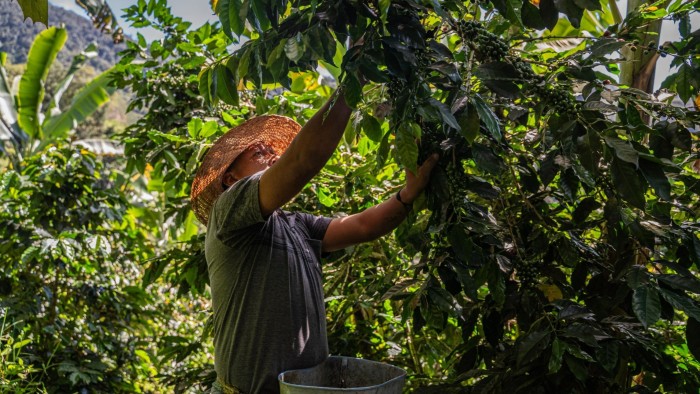Unlock the White House Watch newsletter for free
Your guide to what Trump’s second term means for Washington, business and the world
Colombia faces possible US trade retaliation after its leftwing President Gustavo Petro said he planned to sign up to Beijing’s Belt and Road infrastructure initiative during a visit to China for a regional meeting next week.
Bogotá’s dilemma reflects a broader problem facing the 33-strong Community of Latin American and Caribbean States (Celac) — how to diversify trade and investment without incurring US President Donald Trump’s wrath. Beijing hosts a ministerial forum with Celac on May 13.
Petro holds Celac’s rotating presidency this year and Colombia has long been one of Washington’s most important South American allies. So a move by Bogotá to join BRI would be a significant win for Beijing, with Petro’s remarks already sparking a warning from Washington.
“Petro’s rapprochement with China is a great opportunity for Ecuadorean roses and Central American coffee [in the US],” said Mauricio Claver-Carone, special envoy for Latin America at the US state department.
Colombian businesses, which depend on the US for exports including coffee and cut flowers, interpreted the envoy’s words as a thinly veiled threat by the US to favour their closest competitors. Advisers to Petro have mobilised to try to persuade the president to delay a BRI announcement.
Cui Shoujun, an expert on relations with Latin America at Renmin University in Beijing, said China and the region should use next week’s meeting to “demonstrate their commitment” to push forward with co-operation despite Trump’s trade war.
“Latin America is a very important trading partner as a continent,” he said. “Bilateral trade [with China] this year might surpass $500bn.”
Events such as the China-Celac meeting have become crucial for Beijing to try to counter the impact of Trump’s heavy tariffs among its trading partners. Beijing’s biggest fear is that Washington will persuade them to sign trade deals that cut off vital export markets at a time when China’s weak domestic economy is unable to absorb its enormous manufacturing output.
Latin American states, meanwhile, are weighing how to manage relations with Beijing at a time of acute geopolitical tension. Panama has been reeling from US pressure over what Washington sees as excessive Chinese control of its ports and Trump’s threats to take back the canal. Earlier this year it was forced to withdraw from the BRI.
The US statement on Panama “sent a broader message to the region about Chinese investment and control of sensitive infrastructure”, said Michael McKinley, a former top US state department official.
“Most Latin American countries, however, have a largely transactional view of their relationship with China and are not looking to align themselves politically with Beijing. The region does want to diversify its markets but it also wants to sustain trade and investment ties with the US”.
Brazil, the region’s biggest economy, already counts China as its top trading partner. Leftwing President Luiz Inácio Lula da Silva will attend the Celac meeting, make a state visit to China and hold what will be his third meeting with Chinese President Xi Jinping in just over two years. Gabriel Boric, another leftwinger who is president of Chile, the world’s biggest copper producer, will also attend the Celac meeting.
Mindful of the delicate diplomatic context, Brazilian diplomats have described the event as a continuation of Brazil’s long-standing policy of engaging “global south” powers in the pursuit of multilateralism, rather than a new departure or a response to Washington’s tariffs.
The Celac ministerial meeting, the first since 2021, will agree a road map to guide relations between Latin America and China at a time when Trump is attempting to reassert US primacy over what Washington used to term its “backyard”.
Mexico, which depends on the US market for more than 80 per cent of its exports, is in a particularly delicate position. It has faced increasing US pressure over Chinese imports and investment, particularly in the export-focused automotive sector. Since the coronavirus pandemic, Chinese companies have seen Mexico as an attractive location to export to the US due to its proximity and preferential treatment under the USMCA trade deal.
After years without a clearly defined policy, Mexican officials have now taken action to try to curb Beijing. The government has put tariffs on a wide range of Chinese goods from steel to textiles, promised to set up a national security investment screening programme and tried to help manufacturers substitute Chinese inputs with locally sourced ones.
Wen-Ti Sung, a political scientist focusing on China and Taiwan at the Atlantic Council and Australian National University, said fostering closer ties in Latin America would give China a stronger hand in negotiations with the US.
China is keen to persuade Washington to back off from Taiwan and the South China Sea, both of which it regards as its sphere of influence.
“China likes to accumulate bargaining leverage, and one of the best ways to do it is to create some signs of dissension, some signs of centrifugal forces in your adversary’s immediate backyard,” said Sung, adding that “China has a lot of incentive” to exploit any efforts from Latin American countries to pivot from the US.
Read the full article here




